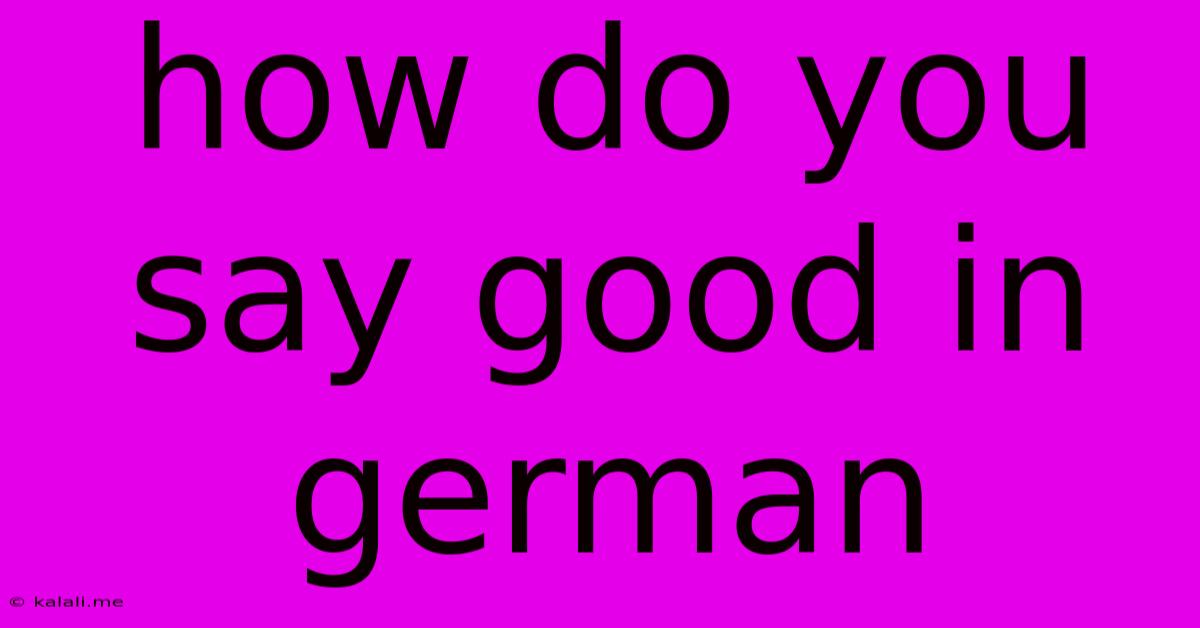How Do You Say Good In German
Kalali
Jun 01, 2025 · 3 min read

Table of Contents
How Do You Say "Good" in German? It's More Than Just "Gut"!
Knowing how to say "good" in German might seem simple at first glance, but the German language, rich in nuance, offers several ways to express this common word, each with its own subtle shades of meaning. This guide dives into the various ways to say "good" in German, depending on the context, ensuring you choose the most accurate and natural-sounding expression.
This article will cover the most common translations for "good," examining their usage in different situations and providing helpful examples. We'll explore how to express "good" in relation to quality, behavior, and well-being. By the end, you'll be confident in selecting the perfect German word to convey your intended meaning.
"Gut" – The Most Common Translation
The most straightforward and widely used translation of "good" in German is "gut". It's a versatile word applicable in numerous contexts, similar to the English "good."
- Example: "Das ist ein gutes Buch." (That's a good book.)
- Example: "Es ist gut, dich zu sehen." (It's good to see you.)
- Example: "Das Essen war gut." (The food was good.)
While "gut" is a reliable choice, it lacks the expressive range of other German words. Let's explore those alternatives.
Beyond "Gut": Exploring Nuances of "Good"
German offers a richer vocabulary to express various degrees and aspects of "goodness." Here are some alternatives to "gut," each with its specific usage:
-
"Schön" (beautiful/nice): Used for things that are aesthetically pleasing or enjoyable. Think of it as expressing a more subjective form of "good."
-
Example: "Das ist ein schönes Bild." (That's a beautiful picture.)
-
Example: "Wir hatten einen schönen Abend." (We had a nice evening.)
-
"Brav" (good/well-behaved): Specifically describes good behavior, particularly in children.
-
Example: "Das war ein braves Mädchen." (That was a well-behaved girl.)
-
"Vorzüglich" (excellent/superior): This word conveys a higher degree of "goodness," implying exceptional quality or excellence.
-
Example: "Das Essen war vorzüglich." (The food was excellent.)
-
"Angenehm" (pleasant/agreeable): This describes something that is pleasing or enjoyable, creating a positive feeling.
-
Example: "Das Wetter ist angenehm." (The weather is pleasant.)
-
"Günstig" (favorable/advantageous): This refers to something that is beneficial or advantageous.
-
Example: "Die Bedingungen sind günstig." (The conditions are favorable.)
Choosing the Right Word: Context is Key
The key to using these words correctly lies in understanding the context. Consider what aspect of "good" you want to emphasize – quality, appearance, behavior, or overall experience. The more precisely you define your meaning, the more effectively you can communicate it in German.
For instance, you wouldn't say "Das Kind war vorzüglich" (The child was excellent) to describe a well-behaved child; "brav" would be a far more appropriate choice. Similarly, you'd use "schön" for a beautiful sunset, not "gut."
Mastering "Good" in German: Practice Makes Perfect
Like any language, mastering the nuances of vocabulary requires practice. Try incorporating these different words into your daily conversations and writing. Pay attention to how native speakers use them in various contexts. With consistent practice, you'll find yourself naturally selecting the most accurate and expressive way to say "good" in German.
Latest Posts
Latest Posts
-
How To Remove A Broken Tub Drain
Jun 03, 2025
-
How Long Is A Phd Thesis
Jun 03, 2025
-
Is It Safe To Turn Off Water To Water Heater
Jun 03, 2025
-
Why Did Mary And Joseph Go To Bethlehem
Jun 03, 2025
-
5 Amp Fuse Keeps Blowing Furnace
Jun 03, 2025
Related Post
Thank you for visiting our website which covers about How Do You Say Good In German . We hope the information provided has been useful to you. Feel free to contact us if you have any questions or need further assistance. See you next time and don't miss to bookmark.